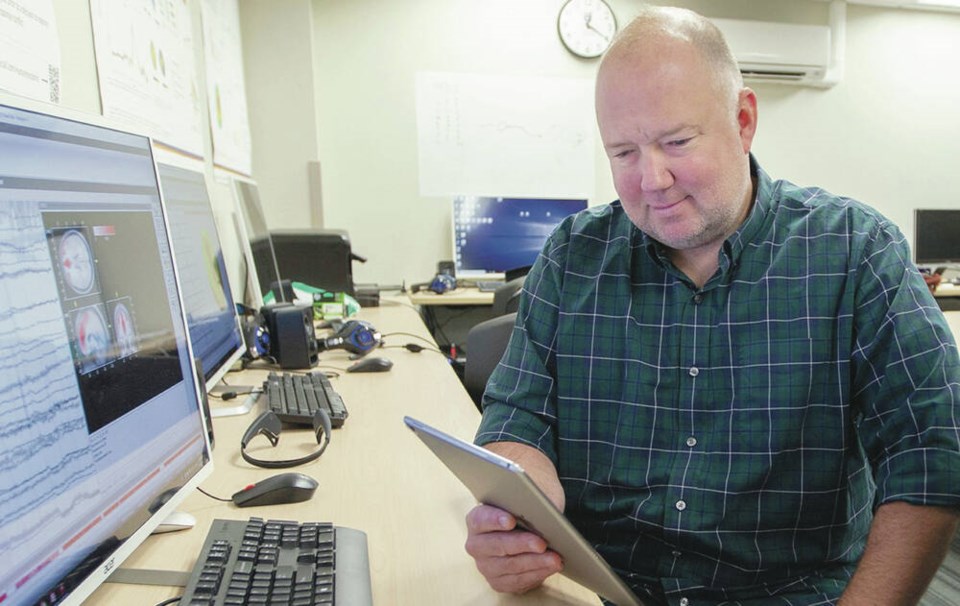We’re coming to the end of a second year dominated by a global pandemic and our brains are tired.
Before the surge of Omicron-variant cases, many people were feeling hopeful that an end to the pandemic could be in sight.
The return of restrictions and upheaval of holiday plans has sent us on an emotional roller coaster, challenging our brains once again to make sense of an ever-changing world, says University of Victoria neuroscientist Olav Krigolson.
“We all thought this was going to be a normal Christmas, right? And all of a sudden that changes,” Krigolson said.
The brain takes in sensory information and experiences to create a belief system about how the world works, but with the rules frequently changing, that system is being asked to adapt more frequently than we’re used to, he said.
That’s on top of the mental fatigue brought on by the prolonged stress and heightened emotional state of pandemic life. Cognitive fatigue can make you feel lethargic, unmotivated and more likely to make mistakes, Krigolson said.
The amygdala, a key part of the emotional system, is “sort of running wild,” making people hyper-sensitive right now, Krigolson said.
When the emotional part of the brain is on overdrive, people are more likely to become upset over something that seems small and to have deep, meaningful conversations with total strangers, because the emotional system is “crying out” to engage, he said.
“The physical equivalent would be literally going on a hike and you think you’re at the top of the mountain but you’re not there yet. They call them false summits.
“And then you keep going and you think you’re at the top of the mountain and you’re not there yet. You turn the corner and you see, oh crap, there’s more to go,” Krigolson said. “That’s what’s sort of happened with us emotionally.”
If you’re feeling unmotivated or unfocused, Krigolson’s advice is simple. Keep your brain healthy with enough sleep, exercise, a good diet and social connection — along with mindfulness techniques.
“Right now, the worst thing you can do, for instance, would be to not exercise at all, sit on your couch, order in … and then grab a bottle of your favourite wine,” Krigolson said. “I know that’s what we all think we want to do, but those are all things that will put you in a more negative brain space.”
Krigolson recognizes how hard it can be to force yourself to make healthy decisions when your brain is already tired — even for someone like him who understands what’s happening in his brain. “It’s kind of like a chicken and egg problem.”
To find motivation at the start of the pandemic, Krigolson used his newfound free time to start a podcast, called That Neuroscience Guy, that he’d been thinking about for years.
“It’s about finding that thing that you want to do in this time and taking advantage that this is what life is like,” he said.
While you can train to deal with cognitive fatigue for short periods of time, like astronauts do before heading to space, brains aren’t really equipped to deal with stress over years without adequate recovery time, Krigolson said.
Given the prolonged stress of the pandemic, it’s important to minimize other stressors in your life, he said.
“We all know that if say, a loved one dies or something, we should take time off and away from work and we should relax and recover. Well, we should be doing that with COVID. The problem is the length of COVID makes that exceedingly difficult. You can’t just take all of COVID off,” Krigolson said. “But it is a time when we should be thinking about reducing our workloads and we should be spending more personal time looking after ourselves.”
Nearly two years in, it’s clear the pandemic is taking its toll on mental health.
The Canadian Mental Health Association and its partners are seeing a steady increase in demand for their services, with people seeking support for anxiety, including in their children, stress, depression, low mood and fatigue, said Jonny Morris, CEO of the association’s B.C. branch. The need may continue to grow even after the pandemic starts to fade.
“What we do know from disasters, like fires and floods, there’s a delay in when the mental-health impact is the most pronounced. It can be three, four, five years, and so we’ve got things being put into place right now,” he said.
In the face of significant issues such as climate change and the pandemic, Morris recommends finding ways to experience as much control in your own life as possible.
He also suggests keeping an eye on changes in yourself. If you notice you’re not sleeping well or sleeping too much, experiencing big changes in your appetite or losing motivation for the things you love for a prolonged time, it can be a good idea to get in touch with a health professional, he said.
Proactively reaching out to friends and family who might be vulnerable can also help.
Immediate mental health support is available 24/7 by calling 310-6789 (no area code required).
A list of options for immediate support is available through the CMHA website.
Other resources
CMHA’s BounceBack provides a skill-building program to develop tools to manage low mood, depression, anxiety and stress.
Foundry Virtual provides virtual services such as scheduling a virtual counselling appointment and finding peer support for people ages 12 to 24.




